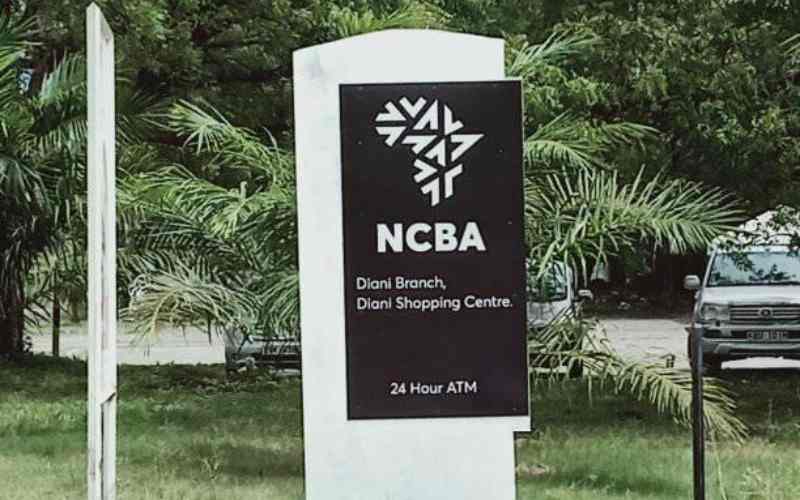

NCBA Bank has emerged victorious in a legal battle over liability for a road accident that left a motorbike passenger seriously injured, after the High Court in Kakamega overturned an earlier ruling that had held the bank jointly liable with the vehicle owner.
The case stemmed from a traffic collision that occurred on December 31, 2017, along the Kakamega-Kisumu road, involving a Suzuki Maruti Omni Bus and a motorcycle.
The crash, which took place near Mukumu area, resulted in multiple injuries to Douglas Ihanji Shikanga, the motorcycle’s passenger.
Shikanga sued both the registered vehicle owner, Ernest Kandu Isiaho, and NCBA Bank, seeking general and special damages.
In July 2022, the Chief Magistrate's Court in Kakamega awarded Shikanga Sh1,521,000 in damages, holding both the bank and the vehicle owner 100 per cent liable for the accident.
However, dissatisfied with the ruling, NCBA Bank appealed the decision, arguing it was wrongly held responsible simply because it was listed as a co-owner of the vehicle used as collateral for a loan.
“The learned trial Magistrate erred in fact and law in failing to appreciate that no liability could lie against the Appellant as a financier and or lender in the purchase of the motor vehicle,” the bank stated in its appeal, contending that it had neither control nor possession of the vehicle at the time of the accident.
The bank explained that it had only financed the purchase of the vehicle by Isiaho, with the agreement that the vehicle would be registered jointly until the loan was fully repaid.
NCBA maintained that this financial arrangement did not extend to control over the vehicle’s use or the actions of its driver.
At the heart of the appeal was whether mere co-registration of a motor vehicle for financial security is sufficient to attract legal liability in case of an accident.
NCBA insisted it should not bear responsibility for the conduct of the vehicle’s driver, arguing there was no employer-employee or principal-agent relationship between it and Isiaho or the driver.
“The registration of the Appellant as co-owner of the subject motor vehicle to secure its financial interest did not invite risk or liability,” the bank submitted.
In his defence, Shikanga argued that the joint insurance cover taken out by NCBA and Isiaho indicated the bank’s awareness and acceptance of the vehicle’s use, thus justifying its liability.
He relied on legal principles of insurable interest and submitted that the insurer would not have included NCBA’s name without its consent and involvement in the vehicle’s operation.
High Court Judge Alice Bett dismissed this line of reasoning, noting that the joint insurance policy was merely a condition of the chattels mortgage agreement and served to protect the bank’s financial interest, not to indicate control over the vehicle or its driver.
“Upon reviewing the evidence, I find that the 2nd Respondent [Isiaho] was not only the sole beneficial owner of the subject motor vehicle but was also the one in possession and exclusive control,” Justice Bett said.
Quoting precedent, the Judge added;
“Ownership of a motor vehicle does not, of itself, establish liability for an accident. The plaintiff must prove that the owner is vicariously liable for the acts of the driver by showing that the driver is an employee or agent.”
Justice Bett referred to the 2010 case, in which it was held that logbook registration is not conclusive evidence of ownership where beneficial and possessory ownership lies elsewhere.
The Judge also cited another case where the court ruled that financiers with no control over a vehicle cannot be held liable for its misuse.
“The Appellant had no control whatsoever over the subject motor vehicle. The vehicle was procured by the 2nd Respondent exclusively for his use… The Appellant’s only interest in the subject vehicle was the full repayment of its loan,” the judge stated.
Justice Bett also found that there was no agency relationship between NCBA Bank and the driver at the time of the accident.
“Simply put, the Appellant had nothing to do with the accident at all,” he concluded.
In the judgment delivered on June 13, 2025, Justice Bett set aside the lower court's ruling and found that liability for the accident rests entirely with Ernest Isiaho.
The Judge ruled that NCBA Bank should not be held responsible and awarded the bank the costs of both the appeal and the original trial.
“The upshot is that the appeal is allowed.
The judgment of the lower court is set aside. In lieu thereof, I enter judgment on liability at 100 per cent as against the 2nd Respondent [Isiaho]. The Appellant shall have the costs of the suit and the appeal to be paid by the 2nd Respondent,” the Judge ruled.











